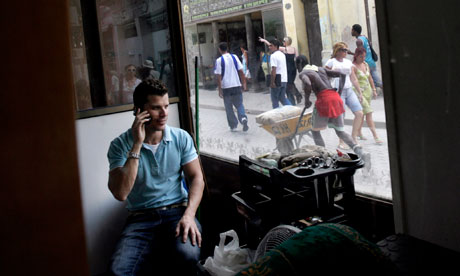Dal Guardian del 25 aprile la nuova ondata di collegamenti a Cuba si chiama telefono cellulare. E il nuovo fenomeno sono le chat
Cuba’s mobile phone boom sees few calls but plenty of chatter
- guardian.co.uk, Sunday 25 April 2010 15.00 BST

Roberto Machado tapped his pocket with a smile and with some ceremony fished out the phone: a Sony Ericsson, vintage 2003. For its new owner this was no clunky relic. It was beautiful.
Machado, a 31-year-old artist, recently received it from an aunt in Spain and was enchanted. “I love it. I tell you, with this life isn’t the same.”
The age of the mobile phone has reached Cuba. Since being legalised by the communist government the phones, once a forbidden badge of foreign consumerism, have become a ubiquitous sight across the island.
Clipped to belts, worn around necks, endlessly fiddled with, you see them everywhere. There is, however, a Cuban twist: very few use the phone to talk.
Machado looked aghast at the idea. “Speak? As in a conversation? Never. Not once. You would have to be crazy or desperate.” Calls are too expensive so the phones are used as pagers. Instead of answering, Cubans note the incoming number and call back from a landline.
Such are the calculations wrought by an impoverished, centrally planned economy where the average monthly wage is $20 (£13). Calls between mobile phones cost 65 cents a minute, and slightly more from a mobile to a landline. Even texting, at 17 cents a message, is considered pricey. A minute-long call to Europe costs $5.85.
It takes enormous sacrifice – or a foreign benefactor – for Cubans to afford the $60 handset sold in government stores and a further $50 to activate the line with Etecsa, the state telephone company. Even so, there is always a queue outside Etecsa’s store on Obispo street in Havana. Many are youths in sunglasses and designer jeans – part of a generation as obsessed by brands as their western peers. “We’re catching up,” said Miguel, a 19-year-old.
All in the queue – faces pressed against the store window – appeared giddy at the prospect of imminent cellular connection. “They’ve been waiting for this a long time,” said a uniformed guard at the shop entrance.
Cuba still has the lowest mobile phone use in Latin America but the number is rising fast, with 480,000 handsets for 11.2 million people, according to officials.
On one level this represents success for President Raúl Castro’s promise to ease the hardships and petty restrictions which stoke resentment among Cubans at the 51-year-old revolution. Bans on DVDs and computers have also been lifted.
From the government’s viewpoint, however, there is a catch. These consumer goods fan a different, rival revolution – in information. Cubans yearn for news other than state media propaganda. “I’m sick of being treated like a 10-year-old who lives on another planet,” one tourism worker put it.
A gossip grapevine nicknamed Radio Bemba (Radio Lip) is the traditional way to supplement official information. The new gadgets – phone cameras, flashcards, DVDs and the occasional internet link – are now multiplying that informal network. The state monopoly over news is history.
“Even if it is not always immediately visible the arrival of new technology brings changes which bubble under the surface,” said Brian Latell, a former CIA analyst and Cuba expert at the University of Miami.
Cubans are better informed than ever before, said Ruben Polanco, 29, an IT worker with a state bank. “With this,” he said, indicating the camera on his Motorola phone, “the truth gets out.”
Three recent examples show the technology’s impact. Last month a baseball game between Industriales and Sancti Spíritus turned into a riot. Police waded into players and spectators – including a communist party chief – with batons and pepper spray. In the past the incident would have been the stuff of rumour, at most, but this time the brawl was captured on mobile phones, loaded on to flashcards, played on computers and DVD players across the island and uploaded to YouTube. “Everyone was talking about it, saying did you see the guy in the headlock,” said Polanco.
Another clandestine video hit was a protest at the Instituto Superior de Arte (ISA) in Havana where dozens of students protested over foul food and other grievances.
A third case has fuelled anger over a scandal at the main psychiatric hospital where at least 26 patients died during freezing weather in January. The authorities admitted a blunder, promised an investigation and hoped to move on. Instead, autopsy photographs showing emaciated, apparently bruised corpses were leaked. “It’s one thing to hear and another to actually see,” said Antonio Gonzalez-Rodiles, 37, a scientist who received the images on a flashcard. “The bodies were skin and bone, like something out of a concentration camp. It’s really, really upsetting.”
Unlike in Burma, Iran and other countries with repressive regimes, Cuba remains calm and stable. There are no uprisings, no mass demonstrations, so information technology poses no immediate risk to the government.
Over time, however, the technology is likely to present an increasingly fraught challenge. The sea still surrounds it, but Cuba is ever less an island.
Bloggers critical of the government, such as Yoani Sanchez, have attracted wide followings overseas and admirers at home, despite internet restrictions. Secret police have struggled to winkle out satellite TV dishes hidden in water tanks, among other places.
Cuba’s government retains formidable control but a battle with information technology is likely to be a battle lost, said Dianna Melrose, the British ambassador in Havana. “They are trying to do a King Canute, they are fighting an impossible tide.”

